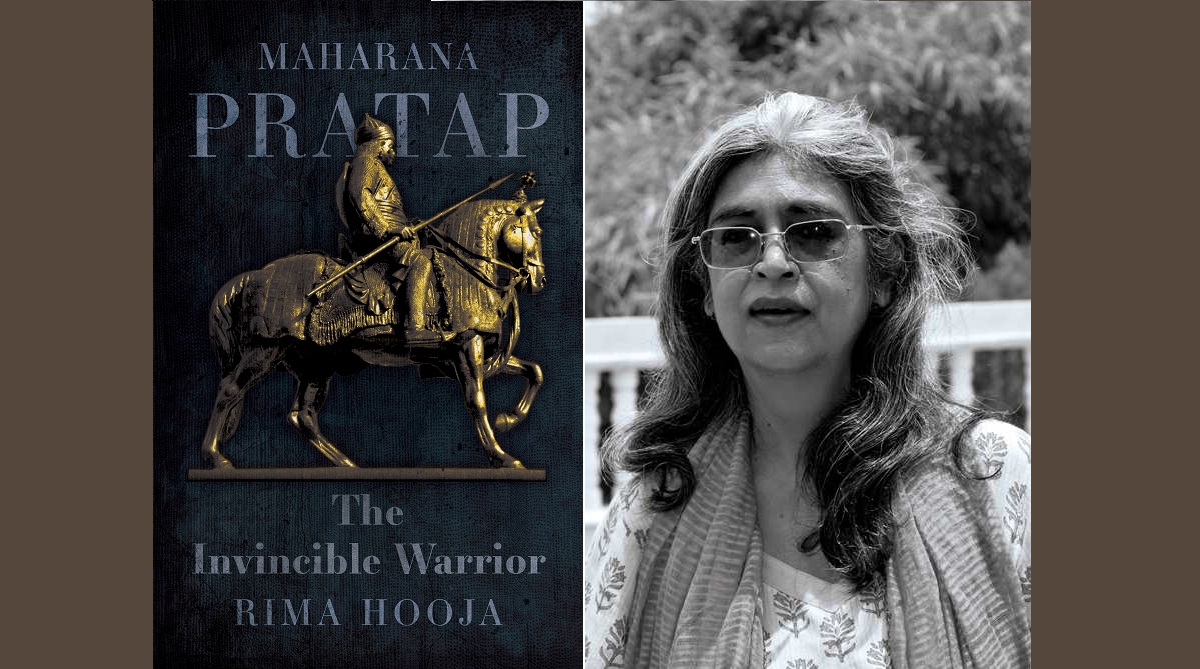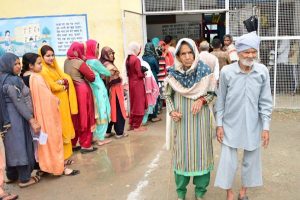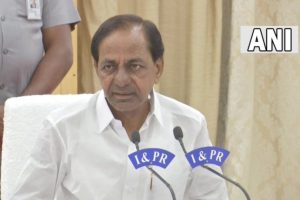The name Maharana Pratap brings to the mind the image of an indefatigable warrior who did not bow before an invader. Over the years, the story of the 16th century king of Mewar, who took head on the might of Mughal emperor Akbar, transcended the rough landscape of Rajasthan and firmly ensconced itself in the hearts of the people in every corner of India. That he was one of the few Rajput rulers to have never submitted turned Pratap into an inspiring hero to many.
Today, Pratap’s legacy has become a political tool with one side claiming that he “defeated Akbar” and upheld “Hindu pride” and another countering it by stating that he “fled” from the battlefield.
Now, a new book on the most famous Maharana presents a story that takes the reader on a journey of Mewar, through the battlefield of Haldighati and the subsequent guerrilla warfare waged by Pratap against the Mughals who invaded his home – Mewar. The book, Maharana Pratap – An Invincible Warrior, takes into account various sources related to Pratap, including the bards who have for generations been singing in praise of the Maharana, to present a wide historical frame within which one can see the Maharana and Akbar as two champions who respected each other despite their intense rivalry.
In conversation with thestatesman.com, Dr Rima Hooja, the author of the book, shares why there was a need to tell the story of Pratap once again and whether Pratap “defeated Akbar”. Dr Hooja, who is one of the most authoritative voices on the history of Rajasthan, also speaks on the practice of Jauhar – which finds mentions in her book; Rani Padmavati of Mewar and Alauddin Khilji, who are now household names thanks to a movie; and Aurangzeb. She also gives her view on how history should be taught in our schools.
Maharana Pratap is counted among the greatest heroes in India’s history. Was he merely a warrior who fought against Akbar, or was there more to him?
I think when we talk about our perception of great hero, we tend to go by somebody who has been part of the battle and become a legend. From that point of view, Pratap unfortunately had no chance to portray anything else apart from his battle against Akbar. Obviously, there was a lot more to him. One of which, something that I have picked up in the book also, is that in the short time he had before (the battle of) Haldighati, he commissioned books one of which was a text on agriculture and forestry management. So he was obviously also thinking beyond the battlefield.
What made you feel there was a need for a new book on Maharana Pratap?
I think given a choice I would not have to look at Pratap because there is so much of hagiography around him but what I realise is that a lot of younger Indians will know a very selective bits of Indian history. My book is trying to look at Pratap before Haldighati, after Haldighati and beyond Haldighati.
A debate over the outcome of the Battle of Haldighati has emerged of late. Some political voices continue to claim that Akbar didn’t actually ‘defeat’ Maharana Pratap, whereas historians have said these are RSS’ attempts at “re-writing history”. What is the truth?
I think the truth in history always lies between two extreme views. Specifically for the period we are talking about, there would usually be a surrender of/by the king or commander-in-chief; one or the other side will have someone killed. In this case, Pratap left the field. It looks like he follows the advice of his minister which was that if he was defeated or killed everything would be over. So he did not surrender, was not captured, none of his substitute commanders surrender, and Akbar didn’t announce victory in his darbar (he was not there at Haldighati). And if we take the ‘Pratap won’ logic then it is very strange that you fought a guerrilla warfare for many more years and you are not able to push everyone out of the kingdom.
Thus neither the RSS view nor extreme views – Pratap won or Akbar won – seems to fit this. Now, we want to have clear results. But if you look at more recent history and battles, there are times when something seems inconclusive. It is not a draw, but inconclusive. What people today forget that both sides win honour for what they have done but both sides have lost people on the battlefield.
We would like to know about Akbar. You have written about him in your book. Nothing about Maharana Pratap is complete without Akbar.
Yes. Actually, when I relook at it, even in my book Akbar has not been fleshed out in quite the same way as Pratap. Probably because he is a more invisible presence at Haldighati – he is never really face-to-face very much with Pratap. They impinge on each other’s life but (are) not sitting across a chess board or conceding seats like presidential candidates.
Akbar, as we know him, was a righteous Mughal ruler. How was he different from Maharana Pratap?
Akbar would be an interesting character to write on. He is trying to understand the India he sees around him. He is young, he realises he has people keeping him on the throne, but (eventually) he comes out of their shadows. Jain sources say he had a guru from whom he had been taking information or instructions, or was holding discussions with highly revered Jain scholars. And they claim that he learned how to perform yogic asana. The Mughal records may not speak of this but Jain ones do. Thus history writing is not sometimes clear. So are they correct? Well, probably, otherwise why bring it up unless there is some other axe to grind? Akbar does become vegetarian for certain days. He is maintaining parallel traits of the Timurid and Mongol lineage. So, on the one hand battlefield means victory but Akbar, who was illiterate in the formal sense, would hear things read out to him. I am sure that he would have been intrigued by the fact that Samarkand, which his grandfather (Babar) always thought about, had an observatory. I think Akbar, while exploring India and trying to make sense of the world around him, was less of a typical ruthless ruler. He was ruthless as all rulers were at the time but was more appreciative of poetry and music than Aurangzeb would have been.
While Akbar enjoys a degree of respect till date, Aurangzeb does not. Why? Some historians are trying to present Aurangzeb as a benevolent Mughal who was kind to Hindus, contrary to certain historical accounts and popular belief. What is your view on that?
I think there were shades of grey for everybody. In Akbar’s case, his shade of black comes out when as a young man he ordered a massacre of all people alive after the fall of Chittorgarh. Women had committed Jauhar and men had done Shaka (fight till death). That means whoever were left were non-combatants, old people or someone hoping to get mercy. Whether it is 10 or thousand, Akbar is extreme at that point. In Aurangzeb’s case, there are many more shades of black. That’s why, to an average Indian mind, the contrast is there. The museum at Banaras Hindu University has an inscription describing Aurangzeb having donated money for the upkeep of a temple but that gets countered with several other temples which he is known to have destroyed. We tend to confuse personal religion and acts of violence which tend to keep the larger group of believers on one’s side. Aurangzeb did many things which he believed in from his own religious perspective but he did a lot of things to keep his section of voters happy.
So it was all realpolitik?
I think it would have been. There was an incident where he sent his army into a part of Rajasthan. Many have written about it, including Richard Eaton. They said Aurangzeb was angry because one of his courtiers left court without permission and he was showing displeasure in an extreme manner. Now, we don’t have the means to go back into the past to find it out but it seems this was very much part of Aurangzeb’s character. But the same Aurangzeb feels that state money should not go into his personal upkeep. Everyone has shades of grey; it is when the shades of black takes over the white that we have a problem.
There was recently a movie on Rani Padmavati. A certain section questioned Padmavati’s Jauhar. In your book, you have mentioned the many jauhars of Mewar. What is your view on Jauhar and the argument of the section that questioned Padmavati’s decision?
I think everybody has the right to say what they want. But we must also realise that we are looking at something which happened in the past; the call was taken by someone on the basis of their own upbringing and the society around them and the conditioning. If it is wrong, it probably is wrong but it is a choice not one woman took which comes through in the movie but several women over the years have taken – they could have also taken their own lives using a sword, dagger or something.
Now, is it conditioning? Is it right? Is it wrong? I would give another story from Rajasthan which entails self-immolation. One of the queens of Marwar-Jodhpur area was a princess from Jaisalmer, Umade (Umade Bhattiyani). She was like other Rajput women – was brave, used swords. She caught her husband philandering with a maid. She would then have nothing to do with her husband and was known as the Ruthi Rani. She literally had no physical relation with her husband, and was respected for it. When Ajmer came under threat from enemies, the husband wrote to the commander of the fort to escort the queen to safety and defend the fort. The queen shoots back a message to the king telling him that she is the daughter of a Rajput and can defend herself and the fort. Fortunately the attack doesn’t take place and she is given charge of Jodhpur fort. When her husband, Rao Maldeo, died, she opted for self-immolation.
Why? What goes on in their head? The feminists would decide it is conditioning. But even if it is conditioning, at a point where she has this free will and need not have immolated herself, she chooses to do it. A colleague from Jaipur looked at it in this way: She had no children and was supporting one of the stepsons who was not becoming the ruler. Was that the reason or was it that she had given up needing any reason for living a long time earlier? In her eyes this would not have been suicide; this would have taken her to heaven or another incarnation.
Again, looking at Jauhar – if you grow up thinking that dying in battle is the best thing that can happen to you as a man, the same thought process applies to the women. We do have a Mewar queen who dies fighting for Chittor and then there is another who enters Jauhar fire. So is it indoctrination? Obviously, but then it is a time-bound thing. How do we judge it? What is happening in today’s world, such as the condition of women in Syria and places where extremists groups are present, how can anyone go into the minds of the captive women and say ‘should you turn the clock back what would you do’?
Some have praised Alauddin Khilji as a misunderstood Sultan. How far do you agree to such a description?
In the context of Khilji and Padmavati’s Jauhar in the movie, Alauddin had conquered other kingdoms and taken women forcefully into his harem. It was known to the women of that time.
What comes through in the film is Khilji as a warmongering sultan, which he probably was, but then he was supposedly very good in administration also. One of the things he reintroduced was branding the horses of his cavalry to ensure military efficiency. So he had a head for administration. There is another story when the Ranthambore fort fell and women had committed Jauhar (1301 AD). In popular perception, the reason for attack was that a couple of Mongol chiefs had been given refuge by the Rajput ruler. The story goes that when the (Mongol) men were brought before Khilji, he asked one of them what he would do if he gets his life back again. The Mongol said ‘I will put Hamir (Hammirdeva) of Ranthambore’s son on the throne and chop your head off’. It seemed that Khilji appreciated the fact that this man was standing up for the ruler who had given him shelter even when it was facing certain death. Khilji gave the Mongol an honourable death – which means getting trampled by an elephant but a proper burial, which matters to a Muslim. And when Hamir’s ex-minister, who switched loyalties, comes to Khilji seeking reward, the Sultan gives him death by torture. Khilji tells the minister that he cannot be loyal to the Sultan because he was not loyal to his Rajput master despite being a Hindu.
But this does not mean one needs to bend over backwards to make everybody appear beatified. There is probably a lot more to every character.
A section claims that our school history textbooks either obfuscate truths about the past or present a distorted narrative, especially about the ancient period and the Hindu rulers of the medieval times. Is there any weight to such a claim?
Writing textbooks is always difficult. I have taught history and I wish I had taught it to younger people earlier. What I realise is that we want to encapsulate everything we know of in history and shove it down the throats of everyone so that they have an equal amount of knowledge about every period of the past, which is actually not possible. There is a limit to how much you can remember about anything. What we should be doing is give a lot more examples and let students realise that people used to respond in a specific manner to something according to the period. So you are looking at the broad trends of what constitutes an efficient ruler. It might be Chandragupta Maurya who forged the first empire in India. It might be Ashoka because he feels that having a better quality of life means more than battle.
If we could bring in a little of local history as a kick off point to help students realise that past is not a foreign country and people looked and thought more or less like we do; that’s what a breakthrough would be. What we are doing today is that every child should be memorizing XYZ about so much. To be fair because we are one country so they do know equally about Lachit Borphukan, etc. How is it possible? And if it is possible, we may have to find more ways – stop having exams and do a lot more of info-discussions, field trips and museum visits.
Do you think the TV serials made on Maharana Pratap portray him in the way he should be?
I think the more recent one is preoccupied with a child and his adventures, but I guess if you are making film, TV series or poem, it is the perspective of the person doing it that comes through. If it is a distortion of history then they should say it is fiction and not call it Maharana Pratap. Just having a little disclaimer may not help. Having said that, someone like Pratap has so much added to what has been handed down through some legendary stories about Pratap that can be found in my book. To use a different analogy, it is like Mahabharata and the travels of Pandavas. There are so many stories about them such as how they prayed and married local princesses (like) Arjun and Chitrangada, about whom there is a play. We may call for more responsible TV serial making but that would be like putting an embargo on anyone trying to express anything at all. It is like a chicken and egg debate on creativity versus facts.
Why have you called Maharana Pratap “The Invincible Warrior”?
He probably has his frailty but I think I am referring to the reaction of Akbar when he hears one of his major opponent’s death. I think that is actually Pratap’s final victory: That in death your opponent, even if doesn’t shed a physical tear – though Rajasthani annals claim he did – but bows his head in grief, you have won. Akbar may have realised at his age that Pratap is gone today and ‘I will be gone tomorrow’. ‘Has life itself been worth it?’ As I say, people of any generation of the armed forces understand as soldiers the meaning of respect for a worthy adversary.
I think soldiers still have the same kind of respect for each other even today.
One of our local newspapers was carrying a story from 1965. It said that there was a bunker and from it a young Pakistani soldier – a Captain – kept shooting at the Indian forces. He eventually died. His bravery was posthumously rewarded by his country, and then the line (in the Indian report) says ‘as should have been’. So the writer, a former Army man from India, is recognising the valour of the Pakistani soldier.











